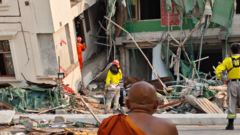In response to questions regarding the US's ability to aid in the wake of the recent earthquake in Myanmar, Secretary of State Marco Rubio defended the government’s actions and emphasized the role of other nations.
US Secretary of State Dismisses Criticism Over Myanmar Quake Response

US Secretary of State Dismisses Criticism Over Myanmar Quake Response
Marco Rubio addresses humanitarian aid concerns following the earthquake in Myanmar, highlighting limitations and expectations from other nations.
Following the catastrophic earthquake in Myanmar that claimed over 3,000 lives, US Secretary of State Marco Rubio has faced scrutiny regarding the United States’ response. During a recent BBC interview, Rubio rejected criticisms that the Trump administration’s dismantling of the US Agency for International Development (USAID) severely hampered American assistance. He asserted that the United States cannot be "the government of the world" and must focus on balancing humanitarian efforts with national interests.
Rubio highlighted that while the US has the capability to deploy extensive aid, including rescue workers and specialized equipment in disaster situations, the military junta governing Myanmar is a complicating factor. Despite a formal request for assistance from Myanmar, Rubio claimed access issues have limited the US response. Former USAID officials expressed dissatisfaction with the lack of deployment, linking it directly to funding cuts that have left the agency with diminished capabilities.
Notably, since the Trump administration, under advisor Elon Musk's leadership of the Department of Government Efficiency, USAID has faced significant reductions in resources aimed at foreign aid. Rubio acknowledged that the US is willing to provide help but noted the responsibility also falls on wealthier nations like China and India, who have already mobilized resources on the ground.
The Secretary's comments reflect a broader narrative regarding the changes in US foreign aid policy. He criticized past funding models that disproportionately benefitted NGOs and declared that the country is transitioning to support more sustainable and direct assistance efforts.
Rubio's defense comes amidst growing concerns about the US's role in global humanitarian crises and the implications of the recent dismantling of aid frameworks, as many await concrete steps to address the ongoing humanitarian needs in Myanmar.
Rubio highlighted that while the US has the capability to deploy extensive aid, including rescue workers and specialized equipment in disaster situations, the military junta governing Myanmar is a complicating factor. Despite a formal request for assistance from Myanmar, Rubio claimed access issues have limited the US response. Former USAID officials expressed dissatisfaction with the lack of deployment, linking it directly to funding cuts that have left the agency with diminished capabilities.
Notably, since the Trump administration, under advisor Elon Musk's leadership of the Department of Government Efficiency, USAID has faced significant reductions in resources aimed at foreign aid. Rubio acknowledged that the US is willing to provide help but noted the responsibility also falls on wealthier nations like China and India, who have already mobilized resources on the ground.
The Secretary's comments reflect a broader narrative regarding the changes in US foreign aid policy. He criticized past funding models that disproportionately benefitted NGOs and declared that the country is transitioning to support more sustainable and direct assistance efforts.
Rubio's defense comes amidst growing concerns about the US's role in global humanitarian crises and the implications of the recent dismantling of aid frameworks, as many await concrete steps to address the ongoing humanitarian needs in Myanmar.























